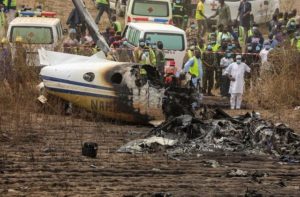A Boeing 350 aircraft said to belong to the Nigerian Air Force NAF201 crashed today in Abuja. The aircraft departed Abuja with six persons on board including two crew. It was gathered that the aircraft reported engine failure at10: 39 AM local time and crash-landed on the final approach path of Abuja Runway 22 at time 10:48 AM local time.

Seven people were reported to have died when the plane crashed on approach to the Abuja airport.
A spokesman for Nigeria’s Air Force, Air Vice-Marshal Ibikunle Daramola said on Twitter, “7 personnel on board died in the crash,”
He added that the Chief of the Air Staff has ordered an immediate investigation into the incident.
Also on Sunday afternoon, a spokesman at the Ministry of Aviation, James Odaudu, said the “aircraft reported engine failure shortly after take-off and crashed-landed on the final approach path of Abuja Runway 22” minutes later.
Odaudu said firefighters were deployed to the scene to put out a raging blaze that had engulfed the aeroplane.
An aviation worker who asked not to be named, citing lack of official clearance to talk to the press said he witnessed the crash. “The crash occurred not very far from the runway. The pilot had tried returning to the runway after taking off,” he said.
The worker said the pilot maneuvered the plane to its crash-site, which is in a desolate area of the airport. He said the aircraft narrowly avoided warehouses and makeshift settlements around the Nnamdi Azikwe International airport.
In a swift reaction, President Muhammadu Buhari expressed deep sadness at the fatal crash of the Nigerian Air Force (NAF) Beechcraft KingAir B350i aircraft, in Abuja, that claimed the lives of seven personnel.
According to a statement issued by Femi Adesina, Special Adviser to the President (Media & Publicity), on behalf of the Federal Government, President Buhari extended heartfelt condolences to family members, friends and colleagues of those who died as a result of this tragedy.
The statement said the president joined the Nigerian Air Force, the military and other Nigerians “in mourning the unfortunate loss of the dedicated and courageous personnel, who died in the line of duty.” President Buhari noted that while investigations into the cause of the crash are ongoing, the safety of the Nigerian airspace remains a key priority of the government.
He prayed that God will comfort the bereaved families and the nation, and grant the souls of the departed peaceful rest.
Nigeria has a history of major air crashes that have claimed many years. In June 2012, a McDonnell Douglas MD-83 airplane operated by a privately-owned domestic carrier, Dana Air, crashed in a suburb of Lagos as it approached landing, killing all 147 passengers and six crew members on board.

Before that, in October 29, 2006, another privately-owned passenger airliner operated by ADC with 114 passengers on board crashed and burned after take-off from the Abuja airport, killing 96 people.
In December 2005, a Sosoliso Airlines DC 9 plane from Abuja crashed on landing in Port Harcourt, killing 106 people, half of them schoolchildren on their way home for the Christmas holidays.
Many of the crashes have also involved military jets. The one with the most casualties remains the crash of a Nigerian Air Force C-130 transport plane that crashed in September 1992 only minutes after taking off from the airport in Lagos, killing almost 200 senior military officers and other ranks.